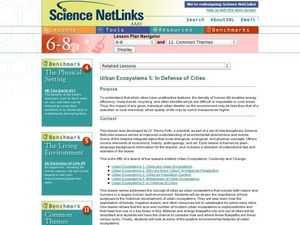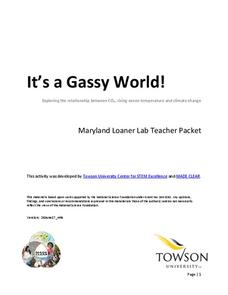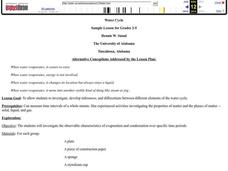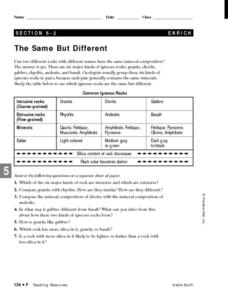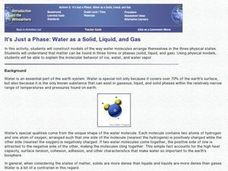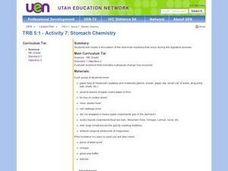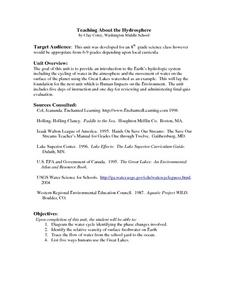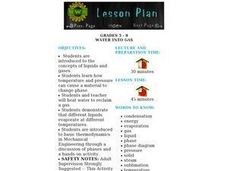Curated OER
It's The States of Matter
Students investigate the properties of solids, liquids and gases. In this states of matter lesson plan, students observe dry ice and its characteristics. They calculate the density of dry ice and observe the sublimation of the dry ice...
Curated OER
Heat And Heat Transfer
Students role play molecules in a container as the container is heated to develop a definition of heat and temperature. They also observe demonstrations of conduction, convection, radiation, and phase transfer. Using these observations...
Curated OER
Selling The Molecular Kinetic Theory
Students investigate molecule movement according to the kinetic molecular theory. In this kinetic molecular theory lesson plan, students observe demonstrations showing that molecules speed up with increasing temperature and slow down...
Curated OER
Water Vapor Equilibrium
In this chemistry worksheet, students complete 12 short answer questions and problems on water vapor equilibrium. They calculate equilibrium concentrations of reactants and products.
Curated OER
Nothing New? A Physical Change
Fifth graders discuss the differences between chemical and physical changes. In groups, they complete experiments and discover how a physical chnage can be reversed. To end the lesson, they review the steps of the water cycle and...
Curated OER
11 - The Heat Is On
Pupils observe physical change of melting by observing substance in original state, melting substance, allowing substance to return to original temperature, determining if substance retained its original properties, and recording results.
Curated OER
Water and Ice
Students investigate what happens to solids and liquids when they change from one form to another. The amount od space taken by frozen water begins the discussion and students are led to formulate their own hypothesis to research.
Colorado State University
Why Can Warm Air "Hold" More Moisture than Cold Air?—Vapor Pressure Exercise
Does it feel a little humid in here? Learners assume the role of water vapor in the atmosphere as they explore the differences between warm and cold air. They roll dice to determine their level of energy, which determines if they stay...
Towson University
It's a Gassy World!
How much does your class know about the relationship between climate change and carbon dioxide? Science scholars explore the nature of greenhouse gases and rising ocean temperature through demonstrations, research, and experiments. The...
Howard Hughes Medical Institute
Icefish Blood Adaptations: Antifreeze Proteins
Ever wonder how fish survive in freezing cold water—especially Antarctic waters? Some fish have an adaptation that lowers the freezing point of their life fluids. Learners model these adaptations in two lab explorations. The first...
Curated OER
Creative Expressions: Phase Changes
Learners place themselves in the position of a water molecule, ice molecule, or steam molecule and then describe the process of changing phase.
Curated OER
Water Cycle
Students investigate, develop inferences, and differentiate between different elements of the water cycle. They investigate the observable characteristics of evaporation and condensation over specific time periods
Curated OER
Basics of Science
In this basics of science worksheet, students review the metric system, the difference between homogenous and heterogenous mixtures, the scientific method, and science lab first aid. This worksheet has 15 short answer, 43 fill in the...
Curated OER
Wet Dry Ice Lab
In this wet dry ice worksheet, students read the information about dry ice and phase change. Students perform an experiment in which they observe phase changes of ice. Students answer analysis questions as it relates to the phase change...
Curated OER
Thermochemistry
In this thermochemistry worksheet, students indicate whether the given processes are endothermic or exothermic reactions. Students complete the phase change diagram as well as define a given set of vocabulary words. Students calculate...
Curated OER
The Same, But Different
Third graders examine the phase change between solids and liquids and determine it to be a physical change. Ice is the perfect item to use to demonstrate this phase change. Pupils experiment with measuring and weighing solid ice and the...
Curated OER
Exploring Phases of Matter
Students discuss and experiment with the phases of water. In this phases of matter activity, students recognize the different states of matter. Students measure and record changes and understand when the state changes.
Curated OER
It's Just a Phase: Water as Solid, Liquid and Gas
Students construct models of the way water molecules arrange themselves in three physical states - solid, liquid, and gas. They explain the molecular behavior of ice, water, and water vapor.
Curated OER
Stomach Chemistry
Fifth graders compare physical and chemical changes. They perform a simulation experiment/activity that replicates what happens in the stomach as food is digested by stomach acids.
Curated OER
Teaching About the Hydrosphere
Eighth graders are introduced to the Earth's hydrologic system including the cycling of water in the atmosphere and the movement of water on the surface of the planet using the Great Lakes watershed as an example.
Curated OER
Solid Water
Students turn solid water (ice) into liquid water. In this solid and liquid water lesson plan, students use water, ice, cups, and heat in order to change water from one state to another. They draw their findings as well.
Curated OER
Water Into Gas
Learners investigate how temperature and pressure cause a material to change phase. They heat water to reclaim a gas. They demonstrate that different liquids evaporate at different temperatures.
Curated OER
Heating Curve Lab
Tenth graders examine the heating curve of water when head is added constantly over time. They input values into a calculator as they record water temperature every thirty seconds as it is heated on a hot plate. They complete the...
American Chemical Society
Soda Can Steam Engine
Steam engines have been around since the late 1600s, yet most pupils don't know how they work. Using an soda can, the instructor builds a simple steam engine for scholars to observe. Through a discussion, young scientists learn about the...








